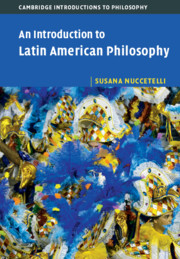Book contents
- An Introduction to Latin American Philosophy
- An Introduction to Latin American Philosophy
- Copyright page
- Dedication
- Contents
- Tables
- Preface
- 1 Setting the Scene: The Iberian Conquest
- 2 Modest and Immodest Feminism
- 3 The Authoritarian Republicanism of Bolívar
- 4 The Liberal Republicanism of Sarmiento and Alberdi
- 5 Homegrown and Imported Positivism
- 6 Martí’s Liberal Anti-Positivism
- 7 Utopian Latin Americanism: Arielism and Mestizofilia
- 8 Soft and Hard Socialism
- 9 Liberation Theology and Philosophy
- 10 Skepticism and Anti-Skepticism About Latin American Philosophy
- Glossary
- Bibliography
- Index of Names and Subjects
- References
1 - Setting the Scene: The Iberian Conquest
Published online by Cambridge University Press: 15 October 2020
- An Introduction to Latin American Philosophy
- An Introduction to Latin American Philosophy
- Copyright page
- Dedication
- Contents
- Tables
- Preface
- 1 Setting the Scene: The Iberian Conquest
- 2 Modest and Immodest Feminism
- 3 The Authoritarian Republicanism of Bolívar
- 4 The Liberal Republicanism of Sarmiento and Alberdi
- 5 Homegrown and Imported Positivism
- 6 Martí’s Liberal Anti-Positivism
- 7 Utopian Latin Americanism: Arielism and Mestizofilia
- 8 Soft and Hard Socialism
- 9 Liberation Theology and Philosophy
- 10 Skepticism and Anti-Skepticism About Latin American Philosophy
- Glossary
- Bibliography
- Index of Names and Subjects
- References
Summary
A number of philosophical doctrines developed as responses to some mainstream views of the Iberian colonial period (roughly, from the late 1500s to the early 1800s). Chapter 1 of this book looks closely at four such doctrines whose central themes concerning Latin America can be traced to that period. It first examines the ideas of three Spanish thinkers, Bartolomé de las Casas (1474-1566), Francisco de Vitoria (1486-1546), and José de Acosta (ca. 1539-1600). The chapter demonstrates that Las Casas and Vitoria were set to determine the moral status of the Spanish conquest, and developed novel doctrines of practical ethics and political philosophy. Acosta raised empiricist objections to Scholasticism in epistemology and philosophy of science. Pressured by the new physical and social realities of the Americas, these three thinkers were among the early challengers of Thomism as interpreted in the Spanish world during the sixteenth century. But the chapter also examines what Edmundo O’Gorman (Mexican, 1906-1995) argued more recently against the myth of Columbus’ “discovery” of America. Clearly, the end of the colonial period was far from marking the end of reflection on philosophically interesting aspects of the Iberian expansion.
Keywords
- Type
- Chapter
- Information
- An Introduction to Latin American Philosophy , pp. 1 - 25Publisher: Cambridge University PressPrint publication year: 2020

